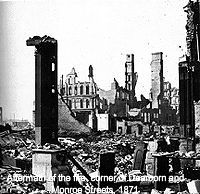Super-Rich Irony
Why do billionaires feel victimized by Obama?
by Chrystia Freeland, The New Yorker
October 8, 2012
One night last May, some twenty financiers and politicians met for dinner in the Tuscany private dining room at the Bellagio hotel in Las Vegas. The eight-course meal included blinis with caviar; a fennel, grapefruit, and pomegranate salad; cocoa-encrusted beef tenderloin; and blue-cheese panna cotta. The richest man in the room was Leon Cooperman, a Bronx-born, sixty-nine-year-old billionaire. Cooperman is the founder of a hedge fund called Omega Advisors, but he has gained notice beyond Wall Street over the past year for his outspoken criticism of President Obama. Cooperman formalized his critique in a letter to the President late last year which was widely circulated in the business community; in an interview and in a speech, he has gone so far as to draw a parallel between Obama’s election and the rise of the Third Reich.
…
In the letter, Cooperman argued that Obama has needlessly antagonized the rich by making comments that are hostile to economic success. The prose, rife with compound metaphors and righteous indignation, is a good reflection of Cooperman’s table talk. “The divisive, polarizing tone of your rhetoric is cleaving a widening gulf, at this point as much visceral as philosophical, between the downtrodden and those best positioned to help them,” Cooperman wrote. “It is a gulf that is at once counterproductive and freighted with dangerous historical precedents.”
…
The growing antagonism of the super-wealthy toward Obama can seem mystifying, since Obama has served the rich quite well. His Administration supported the seven-hundred-billion-dollar TARP rescue package for Wall Street, and resisted calls from the Nobel Prize winners Joseph Stiglitz and Paul Krugman, and others on the left, to nationalize the big banks in exchange for that largesse. At the end of September, the S. & P. 500, the benchmark U.S. stock index, had rebounded to just 6.9 per cent below its all-time pre-crisis high, on October 9, 2007. The economists Emmanuel Saez and Thomas Piketty have found that ninety-three per cent of the gains during the 2009-10 recovery went to the top one per cent of earners. Those seated around the table at dinner with Al Gore had done even better: the top 0.01 per cent captured thirty-seven per cent of the total recovery pie, with a rebound in their incomes of more than twenty per cent, which amounted to an additional $4.2 million each.
…
This is the group that has benefitted most from the winner-take-all economy: the 0.1 per cent, whose share of the national income was 7.8 per cent in 2009, according to I.R.S. data. Moreover, even as the shifting tides of the global economy have rewarded the richest while squeezing the middle class, the U.S. tax system has favored the very top, as the tax returns of the Republican Presidential candidate, Mitt Romney, have illustrated. In 2011, Romney paid an effective tax rate of just 14.1 per cent, and his income of $13.7 million places him in the 0.01-per-cent group.
…
The President, in Cooperman’s view, draws political support from those who are dependent on government. Last October, in a question-and-answer session at a Thomson Reuters event, Cooperman said, “Our problem, frankly, is as long as the President remains anti-wealth, anti-business, anti-energy, anti-private-aviation, he will never get the business community behind him. The problem and the complication is the forty or fifty per cent of the country on the dole that support him.”
…
“It’s a question of tone,” Cooperman said. “The President makes it sound like the problems of the ninety-nine per cent are caused by the one per cent, and that’s not the case.” Yet some of the harshest language of this election cycle has come from the super-rich. Comparing Hitler and Obama, as Cooperman did last year at the CNBC conference, is something of a meme. In 2010, the private-equity billionaire Stephen Schwarzman, of the Blackstone Group, compared the President’s as yet unsuccessful effort to eliminate some of the preferential tax treatment his sector receives to Hitler’s invasion of Poland. After Cooperman made his Hitler comment, he has said, his wife called him a “schmuck.” But he couldn’t resist repeating the analogy when we spoke in May of this year. “You know, the largest and greatest country in the free world put a forty-seven-year-old guy that never worked a day in his life and made him in charge of the free world,” Cooperman said. “Not totally different from taking Adolf Hitler in Germany and making him in charge of Germany because people were economically dissatisfied. Now, Obama’s not Hitler. I don’t even mean to say anything like that. But it is a question that the dissatisfaction of the populace was so great that they were willing to take a chance on an untested individual.”
$4.2 million each. Why that’s your Sesame Street Workshop right there.
You wouldn’t want to blend in with ‘ordinary’ things.

 On this day in 1776, the Continental Congress formally declares the name of the new nation to be the “United States” of America. This replaced the term “United Colonies,” which had been in general use.
On this day in 1776, the Continental Congress formally declares the name of the new nation to be the “United States” of America. This replaced the term “United Colonies,” which had been in general use.



